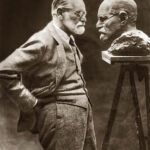Criticisms of Freud: Commentary on the Freud Wars
 Today’s Wall Street Journal offered a book review by Adam Kirsch of, yet another, “quasi-biography” of Sigmund Freud. The book in question is Freud: The Making of an Illusion by Frederick Crews, the latest in his seemingly endless criticisms of Freud. As noted by Kirsch, this endless war on Freud by Crews is a direct attack against the person of Freud and, by extension, an assault on nearly everything Freud had to say about the human mind.
Today’s Wall Street Journal offered a book review by Adam Kirsch of, yet another, “quasi-biography” of Sigmund Freud. The book in question is Freud: The Making of an Illusion by Frederick Crews, the latest in his seemingly endless criticisms of Freud. As noted by Kirsch, this endless war on Freud by Crews is a direct attack against the person of Freud and, by extension, an assault on nearly everything Freud had to say about the human mind.
Crews, a Professor Emeritus of English of UC Berkeley, is a well-established literary critic who had once embraced psychoanalytic theory, but has since become one of its most vociferous dissidents. His current work goes beyond his usual attacks against psychoanalysis as a “pseudo-science” and is a direct disparagement of Freud himself as a con man, liar, bully, plagiarist, and false prophet.
As a psychoanalyst myself, I wonder if Crews’ apparent obsession with destroying Freud and psychoanalysis represents what would be labeled a reaction formation–the exaggerated attempt to conceal a private truth (envy) with its opposite (contempt). This was not Crews’ first harsh criticism of Freud, which dates back decades. His agenda to eradicate Freud and Freudian theory ironically betrays his indebtedness to Freud for having established a basis for Crews’ career.
No doubt that Freudian psychoanalysis has changed significantly since Freud (who died in 1939), as he, himself, revised his ideas at least five times over a 40-year period. Nevertheless, he provided 23 volumes of writings on the human condition that have stimulated the search for understanding the complexity of the human mind, our motivations, and our unique forms of psychological sufferings. Freud offered a humane approach to understanding madness, an early attempt at clinical treatment, a recognition for the importance of child development and child-rearing practices, and a method for understanding the humanities. Obviously, the legacy of Freud’s ideas has been remarkable.
Despite Freud’s many critics and continued controversy, Nobel-laureate neuroscientist, Eric Kandel, noted that “psychoanalysis still represents the most coherent and intellectually satisfying view of the mind” (Kandel, 1999, p. 505). Freudian theory, while not a rigorous scientific model that can be easily tested in a laboratory, poses necessary questions that require inter-disciplinary study from all the humanities. Humans live in both a shared empirical reality and a private, personal world of fantasies and imagination.
Rational-empiricists, like Crews, seem to believe that science, in its purest form, is the only truth. If that were so, why become an English professor? Science is not a subject matter, but rather is a methodology for research. The humanities represent other methodological forms that also explore stories about the human experience. A psychological truth that ignores these other stories denies the essence of the inquisitor. Humans are ultimately story-makers regardless of what those stories are about; physics, poetry, or dreams. All our knowledge, no matter how rational or empirical, will always remain human knowledge.
Criticisms of Freud can make important contributions toward a dialogue of ideas. Unfortunately, character assassination presents as excessive disputation that does little to promote meaningful discussion. Freud, the man, is dead; eviscerating his corpse appears to me as spiteful and mean-spirited and serves no intellectual or scientific advantage.
To read more on Freud’s theory, see Classical Psychoanalytic Theory.
Interested in earning a Certificate of Advanced Study in Psychoanalytic Psychotherapy? Simply complete 48 CE credits with our psychoanalytic courses, including at least three course courses. Entirely online, accessible 24/7, and paced at your convenience.
 The Institute of Advanced Psychological Studies is approved by the American Psychological Association to sponsor continuing education for psychologists. The Institute of Advanced Psychological Studies maintains responsibility for this program and its content.
The Institute of Advanced Psychological Studies is approved by the American Psychological Association to sponsor continuing education for psychologists. The Institute of Advanced Psychological Studies maintains responsibility for this program and its content.
References







